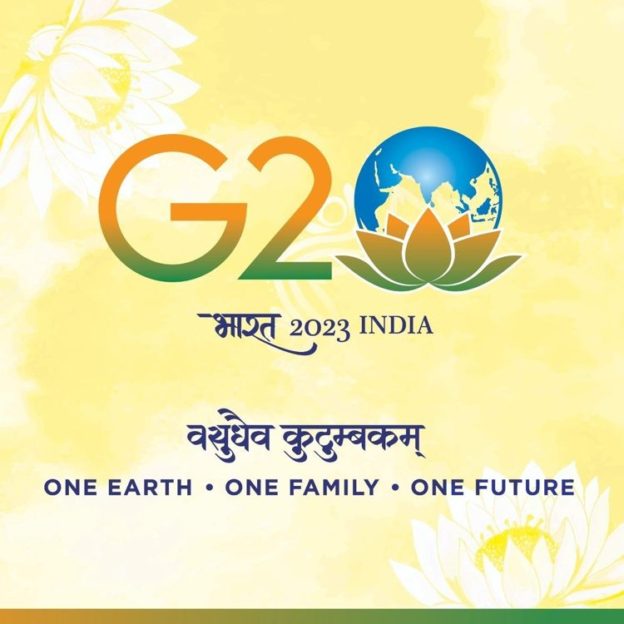The structure of the G20 meetings is inter-sectoral in nature, covering crucial development challenges ahead of us; including disrupted supply chains, scanty climate financing and Global recession.
Inclusivity, Engagement and Outreach has been the hallmark of Indian G20 presidency since its inception on 1st December 2022. The Ministry of External Affairs has set up the secretariat within the prestigious Sushma Swaraj Bhawan to oversee the management and delivery of the G20 outreach across the country. Public outreach, Diplomatic engagements, and Public meetings are being conducted at an unprecedented rate leading upto the summit level discussions in September 2023. The vision of the Prime Minister to translate India’s G20 presidency into a carnival of Global diplomacy for Hope, Harmony, Peace, and Stability has been the unpinning theme for deliberations for every department across all state and Central ministries. The Scale of the G20 Indian presidency could be estimated by the number of engagement group meetings underway across 56 locations since the inception of the Indian presidency.
India has introduced Startup20 to the existing list of forums; Women20, SAI20, Labour20, Civil20, Urban20, Union20, Youth20, Think20, Science20 and Business20. The structure of the G20 meetings is inter-sectoral in nature, covering crucial development challenges ahead of us; including disrupted supply chains, scanty climate financing and Global recession. What makes India’s G20 presidency special is the central placement of India in discussions across Climate change, Energy security, Food security with the greatest demographic dividend.
India is the voice of the Global South and the nature of the succession of G20 presidency both incoming from Indonesia and outgoing to Brazil followed by South Africa, gives India the opportunity to roll out the priorities of the Global south within the G20 forum for an extended duration. India’s G20 presidency is also seen as a reinvigoration of multilateralism and climate discussions after the recent debacles due to the war in Ukraine and the COVID pandemic. For this reason, the theme of the Indian G20 presidency; One earth, One family, One future is a much-needed resurrection of the Sustainable Developments goals and a louder voice of development for the Global South.

The demand for an equitable distribution of development finance and uncompromisable energy security is a contentious issue for the discussion among the global South and North. The dependence on fossil fuels for the foreseeable future in developing economies is the grim reality to serve growing populations in Africa and India. However, a green transition with finance cooperation for developed economies will expedite this otherwise slow transformation. In recent years, India has made Climate change and Development finance for Global south as the centrepiece of its foreign policy. A recent study showed that heat waves, intensified by climate change have cost the global economy trillions of dollars in the last three decades, but this cost was disproportionately borne by the global south which is the least culpable for global warming due to their lower per capita carbon footprint. Most importantly, two major challenges in front of the delicate governance models of the Global south are poverty eradication and Climate crisis, therefore India’s firm leadership is obligated to drive the world out of the climate and financial crisis.
As of now, ongoing deliberations with the Indian presidency come at a juncture where without firm leadership and sharp discussions G20 could become another ‘carbon-emitting conference’. Therefore, micro discussions that strengthen the macro picture need to be broad-based including the protection of rainforests known as the ‘Lungs of the world’ in both Brazil and Indonesia. Unfortunately during the Bolsonaro regime Amazon rainforest came under the threat due to the increased mining destroying the fragile biodiverse-rich forests in Brazil. Similarly, in Indonesia the Borneo forest home to the magnificent orangutans have been under constant threat due to ‘cash-crop’ cultivation of palm trees for their oil.
The case for climate financing is still in a flux due to the lack of fund transfer from the developed economies to developing economies to phase out carbon-based fuels. Private capital to bridge the gap in climate financing through innovative practices including a restructured and globally accepted carbon credit trading system and Internationalisation of climate bonds along with local municipal-level initiatives to reduce the carbon emissions. India’s G20 presidency is a moonshot moment for the world, it is the right medley to become a global giant with its G20 presidency despite the paradoxes it contains. India is vulnerable to climate change, has immense demographic dividend, has become the startup hub of the world along with political stability to drive discussion and sustain them over to the succeeding global south presidencies.
https://www.financialexpress.com/defence/100-days-of-indias-g20-presidency/3021912/





